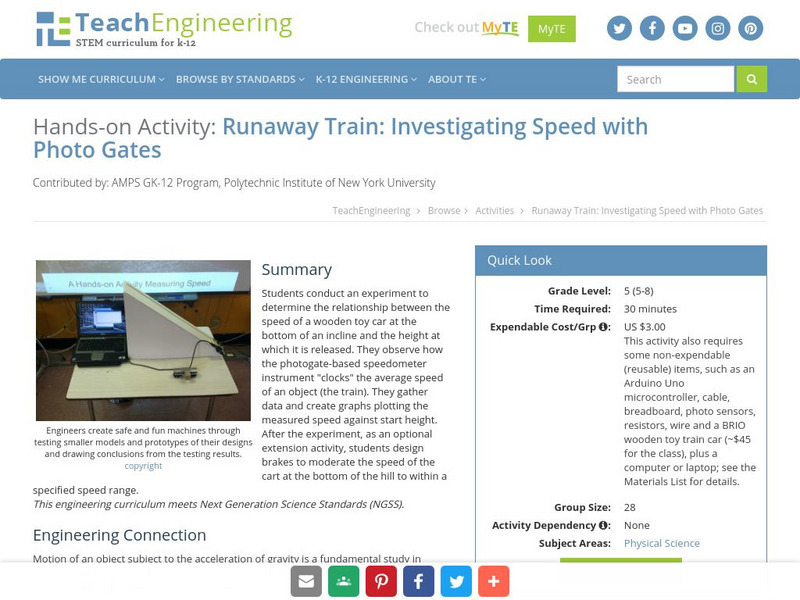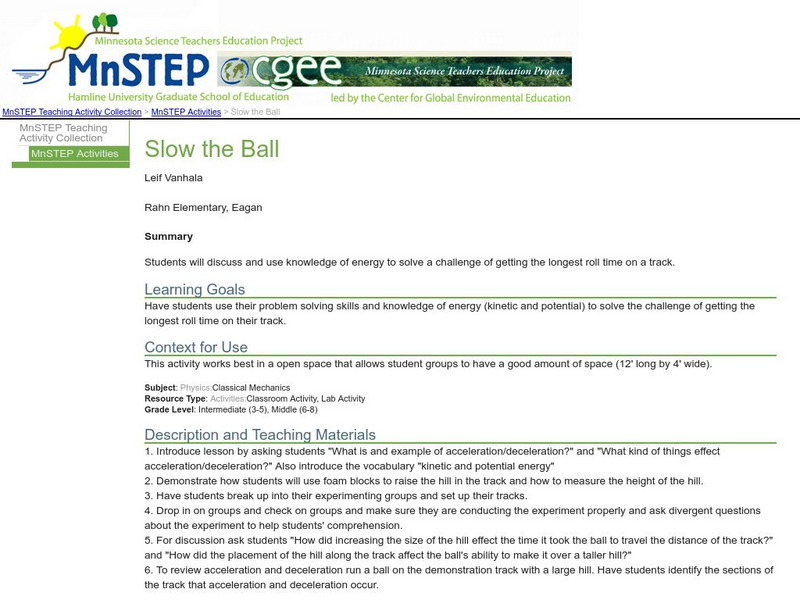PBS
Pbs Teachers: Spool Racer Experiment
Demonstrate stored and kinetic energy by making a racer toy from a spool and a rubber band.
Concord Consortium
Concord Consortium: Molecular Workbench: Experiment on Material Strength
Adjust the strength of interatomic interactions in this virtual bullet experiment. Observe how the adjustments in strength affect the material in the experiment.
Science Education Resource Center at Carleton College
Serc: Using Your Marbles: Making Energy Work for You
This activity is based on the common experiment of running a marble down a ramp to do work on a cup. Students will be able to see the relationship between mass and energy of the marble and the ramp height.
Museum of Science
Museum of Science and Industry: Online Science: Activities: Make a Comeback Can
Step-by-step instructions, with photos, of how to make a metal can come back when it is sent rolling away. The can uses both kinetic and potential energy to roll away and back.
Center of Science and Industry
Cosi Columbus: Rubberband Rollback
A simple experiment that explores potential and kinetic energy involving the use of a can, a rubber band, some washers, and other everyday materials. Discover why the can rolls forward, then back.
Museum of Science
Museum of Science and Industry, Chicago: Activities: Build a Roller Coaster
Build the roller coaster, then keep making adjustments to see how it affects the potential and kinetic energy of the marble along its tracks.
TeachEngineering
Teach Engineering: Runaway Train: Investigating Speed With Photo Gates
Students conduct an experiment to determine the relationship between the speed of a wooden toy car at the bottom of an incline and the height at which it is released. They observe how the photogate-based speedometer instrument "clocks"...
Science Museum of Minnesota
Science Museum of Minnesota: Thinking Fountain: Friction
The Thinking Fountain provides this simple experiment for understanding friction and it relationship to energy.
Museum of Science
The Atoms Family
Let this classic family of monsters guide you as you learn about energy. Interactive exercises, experiments, and demonstrations help to build knowledge and raise questions.
University of Colorado
University of Colorado: Ph Et Interactive Simulations: Reaction & Rate Simulation
Students will learn what causes reactions and what affects the rates of reaction through data collected by conducting several simulated experiments.
TeachEngineering
Teach Engineering: Dams
Through eight lessons, students are introduced to many facets of dams, including their basic components, the common types (all designed to resist strong forces), their primary benefits (electricity generation, water supply, flood...
Science Education Resource Center at Carleton College
Serc: Mn Step: Slow the Ball
For this experiment, students will design a track for a rolling ball to try to have the longest roll time possible. They will, in the process, apply their understanding of kinetic and potential energy, and acceleration and deceleration.
Museum of Science
Museum of Science and Industry Chicago: Online Science: Drop Eggs Into Cups
Step-by-step illustrated instructions showing how to drop four eggs into four cups without touching them. Demonstrates the concept of inertia according to Newton's first law of motion.











